
.

.
Upgraded my suspension through Garden City, great price and service.
reviewed Garden City Tyre & Mechanical.
At Garden City Tyre and Mechanical Toowoomba, we can repair and service all brake systems with the latest equipment:
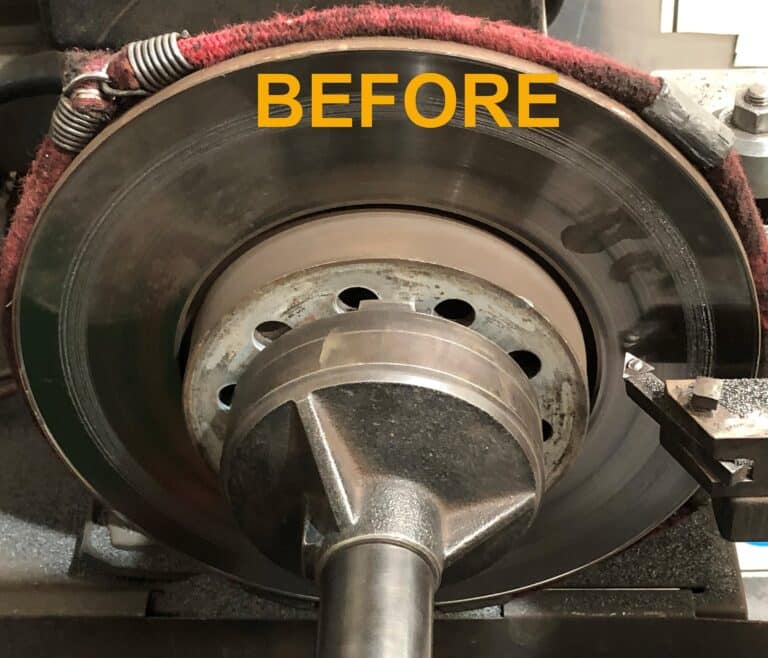
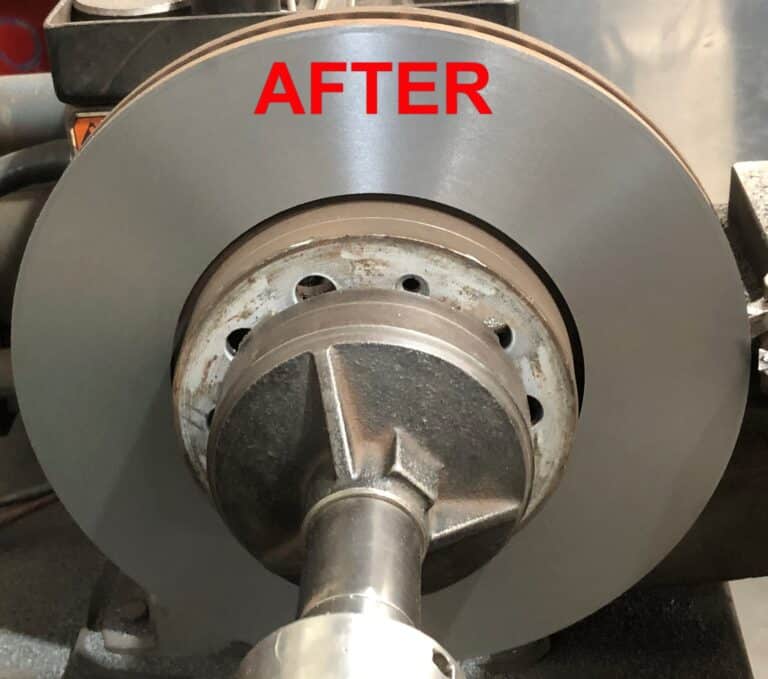
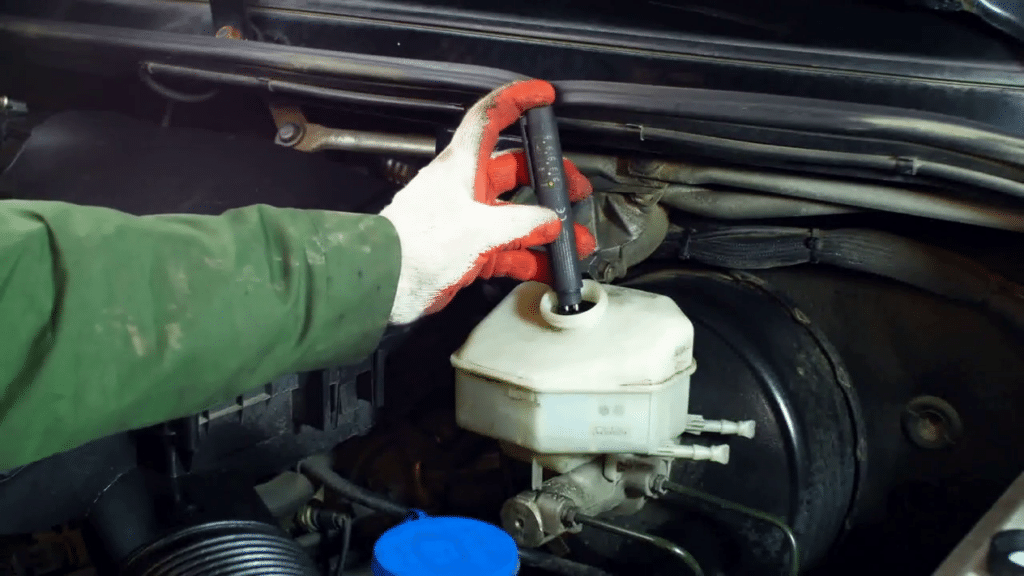
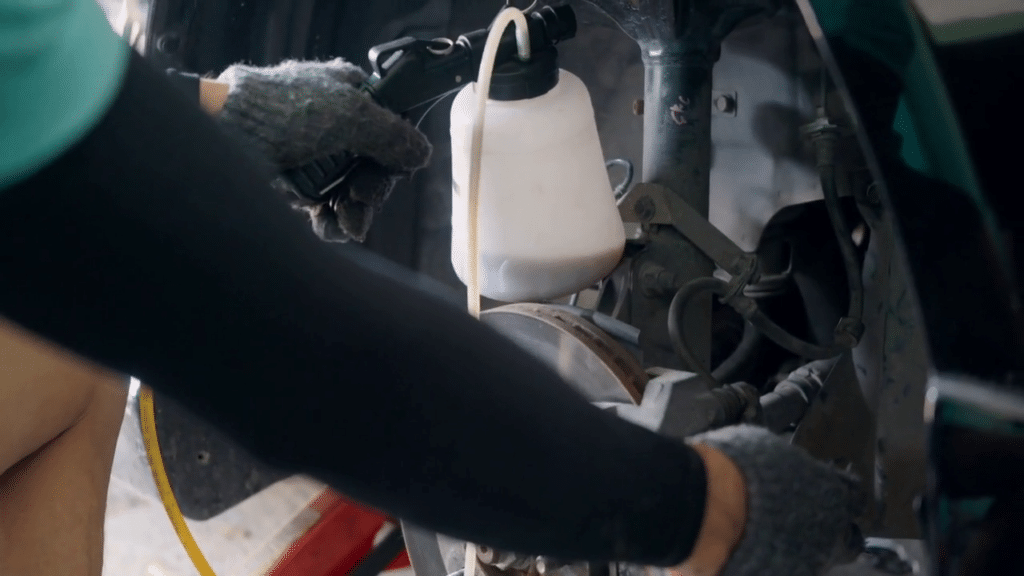
The most common questions and answers we get asked relating to brake repairs Toowoomba, ABS problems and other brake servicing issues are listed in this section.
Remember anything to do with brakes are ultimately a question of safety for you, your passengers and other motorists
Therefore, make sure your brakes are always in good working order so you can stop safely when you need to.
Brake fluid is possibly the single most neglected component of the automobile. Most high-performance drivers check their tire pressures and change their engine oil at frequent intervals, but virtually no one ever changes the brake fluid in their street car. The function of brake fluid is to provide an incompressible medium to transmit the driver’s foot pressure on the brake pedal through the master cylinder(s) to the callipers in order to clamp the friction material against the discs. The foot pressure is multiplied by the mechanical pedal ratio and the hydraulic ratio of the master cylinders, booster (if used) and calliper piston(s).
This is a simple concept. When fresh, all brake fluids are virtually incompressible and the system works as well as its mechanical and hydraulic design allows. There can be, however, significant problems in the proper functioning of brake fluid. Overheated brake fluid can (and will) boil in the calliper. Boiling produces gas bubbles within any boiling fluid. Gas is compressible so boiling brake fluid leads to a “soft” brake pedal with long travel. In extreme cases, overheated brake fluid necessitates “pumping the brake pedal” in order to get a pedal at all.
Replacing front brake pads and rotors typically costs between $200 and $500, depending on the type of your car. The cost includes labour as well as the parts necessary to install the new brakes. Some models may require additional parts such as calipers or sensors, which can add to the overall cost. Specialized mechanics may also charge a premium for their services, which can drive up the price even further.
A typical rear brake job would costs between $150 and $300 plus labour. The price can vary depending on the type of car you have, as certain models may require more specialist tools or labour. Additionally, some mechanics may charge a premium, resulting in even higher overall costs.
A typical brake job usually costs anywhere from $350 to $550, depending on the type of car and scope of work required. This cost typically includes labour as well as parts such as brake pads and rotors. Some models may require additional parts or specialized tools to properly install the brakes, which can drive up the total cost. Therefore, best bet is to get a quote as the requirement varies from each vehicle.
The cost of car brake pads varies depending on the make and model of the vehicle, as different cars require different sizes and types of brake pad. Generally speaking, a set of 4 brake pads for a typical sedan or SUV can run anywhere from $90 to $185. It’s important to note that certain vehicles may require additional parts that add to the cost of the job.
The cost to repair brake pads will depend on the extent of the damage, as well as the make and model of the vehicle. Generally speaking, a mechanic may charge anywhere from $150 to $300 for labour depending on how difficult the repair job is. Additionally, parts such as new brake pads and other components will add to the total cost. It’s best to shop around and compare prices from several mechanics to get an idea of what a fair price would be for your specific repair job.
On average, most brake pads will need to be replaced every 50,000 to 80,000 Km of driving some can last much longer. However, this number can vary depending on several factors such as the type of vehicle and driving style plays a big role. It is important to check your brake pads frequently and monitor their wear so you know when they need replacing. Additionally, some vehicles come with built-in alerts that alert the driver when it’s time to replace the brakes.
It’s recommended to have your brakes inspected and repaired as needed. A lot of stop and start driving is what wears down brake components down the fastest. However, generally speaking, you should have your brakes checked at least once a year, or any time they start to make strange noises or feel like they are not functioning properly. If you are unsure about the condition of your brakes or need help with a repair job, it is best to consult with a professional mechanic for advice. At Garden City Tyre and Mechanical, we check your brakes whenever we rotate your wheels and will let you know if they are starting to wear down and need replacing.
Brake calipers are an essential part of your vehicle’s braking system and should be inspected on a regular basis. Depending on the type of vehicle, brake calipers should be inspected at every service and checked for functionality every time brake pads are replaced. If they start to feel tight or slow to respond, its time to take them off and give them a good service. It is important to have your brake calipers serviced by a qualified mechanic in order to ensure that they are in proper working condition.
Generally, it is best to replace the brakes on either both front wheels, both rear wheels or all four wheels of your vehicle at the same time. This ensures the brakes always work as a pair so the braking force is applied equally to both sides. Then the brakes are evenly balanced and all components are in good working condition. It can also help prevent any potential issues from arising due to unequal braking power between the left and right of your vehicle.
Signs that your brakes need servicing include: squealing or grinding noises coming from the brakes, longer stopping distances when braking, vibrations felt in the brake pedal, or a pulsation or shaking feeling in the steering wheel. If you notice any of these signs, it is important to take your car for service as soon as possible to avoid further damage and potential safety hazards.
Brake excessively binding typically refers to a situation where the brakes are difficult to release after they have been applied. This could be due to an issue with the brake caliper being stuck open or misaligned, or due to air getting into the brake line. The other possible cause of brake excessively binding is a poor adjustment of the brakes, meaning that they are too tight when applied. If you are experiencing this problem, it is important to have your vehicle serviced immediately in order to ensure safe operation and prevent further damage.
Failing to service your brakes can lead to a number of safety issues and decreased performance. Without routine maintenance, components like the brake pads, rotors, and calipers can wear out prematurely and fail. This can reduce your vehicle’s ability to stop properly and increase your stopping distance when braking. Additionally, worn brake components can increase the risk of brake noise or vibration while driving, as well as potentially cause damage to other parts of the braking system such as the ABS sensors. It is essential to have regular service performed in order to keep your brakes functioning properly and safely.
Replacing brake pads without machining the rotors can result in decreased braking performance due to less surface area having contact with the unmachined rotor surface. If the rotors have scores and groves left by old pads, failing to machine the rotors when replacing brake pads will reduce the effectiveness of your brakes, as well as potentially increase vibration or noise while braking. Therefore, it is highly recommended to have both rotors machined when replacing your brake pads in order to ensure optimal braking performance and safety.
The average cost to replace front brake pads can vary depending on the type of vehicle and braking system, as well as the quality of brake pads chosen. Generally, replacing just the front brake pads will usually cost somewhere between $90 and $185 + labour, depending on the factors mentioned previously. It is best to consult with a local mechanic or automotive service specialist in order to get an accurate estimate for your specific car.
If the brake pedal goes to the floor after replacing the pads, it may be due to air in the brake lines. Or you have pushed back the pistons on the caliper all the way back, so you need to pump the brakes pedal a couple of times before you get a firm pedal again. Air can also get into the brakes line if you for some reason have undone the banjo bolt on the brake caliper, creating a spongy feel and losing the effectiveness of braking. The best way to fix this is by bleeding your brakes, which can be done either manually or with a power bleeder. This process ensures that all of the air is removed from your brake system, making for a firm feel when applying the brake and therefore a reliable braking performance.
The lifespan of brake pads can vary greatly depending on a number of factors such as driving conditions, driving style, and the type and quality of brake pads used. Generally, most brake pads can last between 50,000 and 80,000 KM some can last even longer, which is roughly equivalent to 2 to 5 years of typical driving. However, the lifespan of brake pads can be shorter or longer than this depending on the factors mentioned above. For example, heavy braking or driving in stop-and-go traffic can wear down brake pads faster than gentler driving on open roads. It’s important to have your brake pads inspected regularly by a qualified mechanic and to have them replaced when necessary to ensure optimal braking performance and safety.
It is possible to replace brake pads yourself, but it is important to have the necessary knowledge and experience to do the job correctly and safely. In order to replace brake pads, you will need to remove the wheel, remove the old brake pads and install the new ones, compress the brake caliper piston, and then reassemble the brake components correctly. It’s important to use the correct tools and techniques to avoid damaging the brake components or improperly installing the new brake pads, which can lead to brake failure or other serious safety issues. If you are not familiar with working on automotive brakes, it is recommended to have a qualified mechanic perform the brake pad replacement to ensure that the brake system is properly serviced and adjusted for optimal performance and safety.
While it is generally recommended to remove the wheel to check your brake pads, it is possible to perform a visual inspection of the brake pads without removing the wheel.
Here are some steps you can follow to perform a basic inspection:
While this basic inspection can provide some information about the condition of your brake pads, it may not be sufficient to detect all issues. It’s always best to have your brake pads inspected by a qualified mechanic who can perform a more thorough inspection and recommend any necessary repairs.
While it is technically possible to drive with bad brake pads, it is not recommended. Brake pads are an important component of the braking system, and they work by creating friction with the brake discs to slow down and stop the vehicle. When brake pads become worn or damaged, they can reduce the effectiveness of your vehicle’s braking performance and increase the stopping distance. This can cause problems and lead to potentially dangerous situations, especially during emergency stops or when driving at high speeds.
If you suspect that your brake pads are worn or damaged, it is important to have them inspected by a qualified mechanic as soon as possible. In general, it is recommended that brake pads be replaced when they reach 3-5 mm in thickness. Failure to replace worn or damaged brake pads can result in further damage to other components of the braking system, such as creating deep groves the brake rotors, which will then require the brake rotors to be replaced rather than machined.
Whether you need new rotors or just brake pads will depend on the condition of the existing components and the extent of the wear or damage. Here are some general considerations:
If you hear a grinding noise while braking, it usually indicates that the brake pads have worn completely down and are now damaging the rotors. In this case, both the pads and rotors should be replaced.
You do not necessarily need to replace all four brakes at once. In most vehicles, the front brakes wear out faster than the rear brakes, as they are responsible for most of the stopping power. As a result, it’s often the case that the front brakes need to be replaced more frequently than the rear brakes.
However, it’s important to have your brakes inspected regularly as well to determine the extent of the wear to recommend any necessary repairs or replacements. A mechanic will be able to check both the front and rear brakes and provide a recommendation based on the condition of the components.
If it’s determined that all four brakes need to be replaced, it’s recommended that you replace them in pairs (i.e., both front brakes or both rear brakes), rather than replacing just one at a time. This is because replacing just one brake can create an uneven braking force, which may cause problems with the vehicle’s stability and handling.
Vehicle Pulling: A stuck or seized brake caliper can cause your vehicle to pull to one side while braking. This is because one of the brake pads is applying more pressure to the rotor than the other.
Uneven Brake Pad Wear: A seized brake caliper can cause the brake pads to wear unevenly. Check your brake pads for uneven wear or thickness.
Reduced Braking Performance: A caliper that is not applying equal pressure to the brake pads may reduce the vehicle’s braking performance.
Burning Smell or Smoke: A brake caliper that is not releasing can cause the brake pads to rub against the rotor and create a burning smell or smoke coming from the brakes.
If you experience any of these signs or suspect that your brake caliper is bad, get your vehicle inspected by a qualified mechanic as soon as possible. A bad brake caliper can affect your vehicle’s braking performance and lead to unsafe driving conditions.
Here are some signs to look for that may indicate that your caliper is sticking:
If you experience any of these signs or suspect that your caliper is sticking, get your vehicle inspected by a qualified mechanic as soon as possible. Sticking calipers can affect your vehicle’s braking performance and lead to unsafe driving conditions.
Here are the basic steps for servicing a brake system:
If you have any questions regarding servicing your brake system, it is recommended that you consult with an experienced mechanic before beginning any repairs or maintenance work on your vehicle’s brakes.
Here are some signs that may indicate that your caliper is seized:
If you experience any of these signs or suspect that your caliper is sticking, get your vehicle inspected by a qualified mechanic as soon as possible. Sticking calipers can affect your vehicle’s braking performance and lead to unsafe driving conditions.
Determining whether you need to replace your rotors or just brake pads can be difficult without a proper inspection. Here are some tips that can help you determine if you need new rotors or just brake pads:
If any of these signs appear while performing these checks and inspections, take your vehicle to a qualified mechanic in order to get a proper diagnosis and repair recommendation as soon as possible.
A brake pad service typically takes around an hour to complete. During a brake pad service, a qualified mechanic will inspect your car’s braking system for any signs of wear and tear. This includes checking the brake pads, calipers, wheel cylinders, rotors and other parts for damage. The mechanic may also need to machine the rotors or clean the calipers to ensure optimal brake performance. Additionally, they will replace any worn-out parts as needed and make sure that all components are in working order.
Replacing all four brake pads on a car typically takes between one to two hours. To begin the process, a qualified mechanic will remove and inspect the existing brake pads for wear. If the pads are too worn-out, they will be replaced with new ones. The mechanic will then reassemble all the components of your braking system, ensuring that nothing is loose or out of alignment. Once everything is properly connected and tight, the brakes can be tested to make sure they are functioning correctly before you take your car back on the road.
Changing your brake pads and discs can cost anywhere from $200 to $800, depending on the make and model of your car. If you choose to have a qualified mechanic do the work for you, they will likely charge a labour fee in addition to the cost of the parts. The total cost can also vary depending on the type of brake pads and rotors you choose. In some cases, it may be necessary to replace rotors in addition to the pads, which could increase the overall cost.
The ABS light may turn off on its own after the issue that caused it to turn on has been resolved. However, if the ABS light remains on, there are some steps you can take to turn it off:
If these steps do not turn off the ABS light, get your vehicle inspected by a qualified mechanic to diagnose and repair the issue that is causing the ABS light to turn on.
Yes, brakes will still work without ABS. However, a car equipped with ABS has several advantages compared to a car without. ABS-equipped cars are able to brake more quickly and effectively, reducing the chance of skidding and providing better control in emergency situations. Additionally, ABS can help vehicles stop more quickly on wet and slippery surfaces, while braking distance may be substantially increased in vehicles without this feature.
The most common cause for the ABS light to come on is a malfunction or failure within the Anti-lock Braking System (ABS). This can be caused by a variety of reasons, including a faulty wheel speed sensor, low brake fluid levels, or a damaged ABS pump or module. It is important to have the system properly diagnosed and repaired in order to ensure optimal vehicle performance and safety.
The most common problem with an Anti-lock Braking System (ABS) is a malfunction or failure in one of the components. This can include problems with sensors, fuses, wiring, and/or pumps. Additionally, low brake fluid levels can cause the ABS to fail, as can dirt and other debris that may get into the system. It is important to have it properly inspected and repaired by a qualified mechanic in order to ensure optimal vehicle performance and safety.
If you suspect that your Anti-lock Braking System (ABS) may be malfunctioning, it is important to have it properly checked by a qualified mechanic. A qualified mechanic can diagnose the issue with a scan tool and make the necessary repairs to ensure optimal vehicle performance and safety.
If you do not fix an ABS system, it can lead to decreased braking capabilities and potential safety hazards. Failing to repair or replace ABS sensors can result in difficulty stopping your vehicle, as well as reduced control of the brakes. Additionally, an ABS failure can reduce your ability to stay in control during inclement weather or in the event of an emergency braking situation. It is important to have any necessary repairs done promptly in order to ensure that your brakes are functioning properly.
Symptoms of ABS failure include a warning light that may appear on the dashboard, increased stopping distance for brakes, vehicle skidding when braking, and a loud grinding noise from the brakes. Additionally, if the ABS system is failing, it could be difficult to control the steering wheel when braking. If any of these symptoms are present, it is important to have your vehicle serviced immediately as they can lead to potentially dangerous driving conditions.
ABS sensors can fail due to a variety of reasons, such as wear and tear, debris or dirt in the sensor, corrosion of the sensor, or a faulty connection. If an ABS sensor fails, it can lead to decreased braking capabilities and potential safety hazards. For this reason, it is important to have your vehicle serviced regularly in order to ensure that any components such as the ABS sensors are in proper working order.
The cost to fix an ABS light is dependent on the cause. In some cases, the diagnosis and repair may include checking or replacing a sensor or fuse, which can be relatively inexpensive. In more extreme cases, the ABS unit may need to be replaced, which can be significantly more expensive. It is best to take your car to a qualified mechanic for an inspection and repair estimate if you notice that your ABS light has come on.
Repairing ABS brakes typically costs between $500 and $900, depending on the make and model of your car. Depending on the severity of the issue, it may be necessary to replace components such as an ABS control module or a wheel-speed sensor which can add to the cost.
This varies greatly depending on what make and model vehicle the part is needed for. But to give a ball park, it ranges somewhere between $400 to $1000 to get a new ABS module for most cars. This cost excludes any labour charges for installing it. Some models may require additional parts like sensors or relays, which can add to the overall cost. However, in some rare cases, a specialized mechanic may be necessary to complete the job, which could increase the price even further.
Driving with the ABS light on is not recommended due to safety concerns. The ABS light indicates that something is wrong with your vehicle’s anti-lock braking system and should be inspected as soon as possible by a qualified mechanic. Driving with the ABS light on can interfere with your car’s braking performance. It is generally recommended that you take your vehicle to a mechanic for repairs immediately if the ABS light is on.
Yes, a mechanic can fix the ABS light. Although, it not so much the ABS light that needs fixing, but rather the reason the light has come on in the first place that needs attention. The Anti-lock Braking System (ABS) light usually comes on if there is a problem with one of the components of the ABS system, such as a faulty sensor or pump. A mechanic can diagnose the issue, find the faulty component, and fix or replace it to turn off the ABS light. It’s important to have any issues with the ABS system addressed promptly, as it can affect your vehicle’s braking performance and safety.
Yes, it is possible to service an ABS system. Regular maintenance of the ABS system can also help prevent issues from occurring in the first place. This may involve flushing and replacing the brake fluid or inspecting the ABS sensors for signs of wear or damage. It’s important to have any issues with the ABS system addressed promptly to ensure your vehicle’s safety. In some cases, the ABS system may need to be reprogrammed or calibrated.
Why Choose Certified Service?
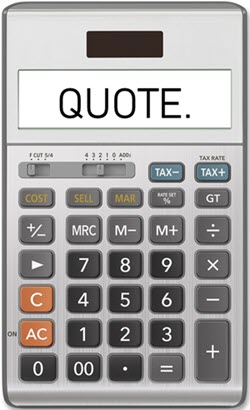
Whether you need a regular Logbook Service, troubleshooting mechanical & electronic issues, Brake Repairs Toowoomba or you are looking to do some upgrades and modifications, just give us a call and our friendly staff are more than happy to give you a quote.

We understand, we have to earn your trust with letting us service and maintain your valuable vehicle. In the unlikely event of a mistake being made, we own it and will make sure everything is fixed according to vehicle manufacturers specifications.

We provide a 100 % Iron Clad Satisfaction Guarantee.
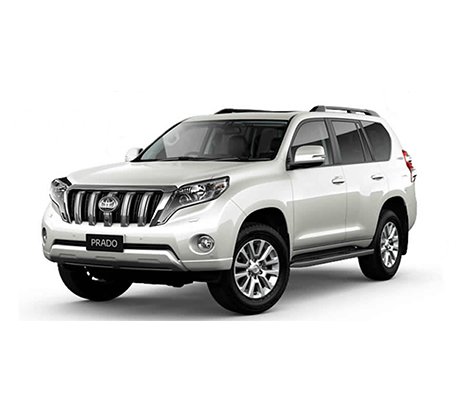
At Garden City Tyre & Mechanical Toowoomba, we’re all about family.
Cnr Neil & Thomas Street, Toowoomba City QLD 4350
Monday–Friday: 07:45–17:00 Saturday - Sunday: Closed
What Our Clients Say

.

.
Upgraded my suspension through Garden City, great price and service.
reviewed Garden City Tyre & Mechanical.

.

.
These guys are awesome. We’ve been taking our cars here for 8 years and the service just gets better. Thanks GCT Team!!!
reviewed Garden City Tyre & Mechanical.

.

.
Fantastic service, quality workmanship and fast turn around!
reviewed Garden City Tyre & Mechanical.

.

.
Jai & Mark are always amazing! Incredible service, nothing is ever a hassle.
reviewed Garden City Tyre & Mechanical.

.

.
Great staff and service always helpful well done to all.
reviewed Garden City Tyre & Mechanical.

.

.
Fitted ST Maxs on the weekend, 3rd set of ST Maxs, 6th set of coopers. Only tyre I trust.
And service from Jai and the guys was great!!
reviewed Garden City Tyre & Mechanical.

.

.
Stoked on the finished job, quick turnaround and competitive price. Cheers fellas
reviewed Garden City Tyre & Mechanical.

.

.
All the staff are friendly and efficient. Very professional with great customer service. I will always recommend to my family and friends. Keep up the great work team.
reviewed Garden City Tyre & Mechanical.

.

.
These guys have great product knowledge and are always more than happy to help out! Their service is outstanding and they have a great range of products!
reviewed Garden City Tyre & Mechanical.

.

.
Recently completed 9000km trip to Cape York, with camper, doing the tele track, CREB just name a few. Before leaving I had the Oztec Suspension and Cooper ST Max tyres fitted, all performed excellent.
Thanks again Garden City Tyre and Mechanical
reviewed Garden City Tyre & Mechanical.

.

.
Great service. Friendly and professional. Went above and beyond with another matter they discovered that a different local mechanic had missed. Can’t recommend them enough.
reviewed Garden City Tyre & Mechanical.

.

.
Great service. Friendly and professional. Went above and beyond with another matter they discovered that a different local mechanic had missed. Can’t recommend them enough.
reviewed Garden City Tyre & Mechanical.

.

.
Great team, very knowledgeable and great products.
reviewed Garden City Tyre & Mechanical.

.

.
Jai and the team always look after us, exceptional service and great prices � Thanks again for another great job today
reviewed Garden City Tyre & Mechanical.

.

.
Excellent bunch of guys to deal with and the car has never driven so good until now cheers .
reviewed Garden City Tyre & Mechanical.

.

.
Friendly, professional and compassionate staff providing superior service and knowledge for competitive rates
reviewed Garden City Tyre & Mechanical.

.

.
Amazing what happens when professionals work on your vehicle. Really happy to have my issue sorted. I will never buy Kuhmo crap again!!!
Thank you guys. 🙂
reviewed Garden City Tyre & Mechanical.

.

.
Great service, fantastic to deal with, So much more than tyres !
reviewed Garden City Tyre & Mechanical.

.

.
awesome work, very reasonable price. would recommend highly!
reviewed Garden City Tyre & Mechanical.

.

.
Jai did an amazing job rolling guards on my S15. Super neat, and exactly what I needed. Great customer service and very easy to deal with. Thanks guys
reviewed Garden City Tyre & Mechanical.

.

.
Today I had a simple repair job to be done on a flat tyre. I found the staff to be prompt, helpful, courteous and efficient. I would thoroughly recommend this local business.
reviewed Garden City Tyre & Mechanical.

.

.
We are proud customers of Garden City Tyres and are 110% happy with the service provided every time we visit. Jai always recommends the best products suited to our needs, and the team do an amazing job in the workshop. Highly recommended!!!!
reviewed Garden City Tyre & Mechanical.

.

.
great service and great work ethic. will definitely be back!
reviewed Garden City Tyre & Mechanical.